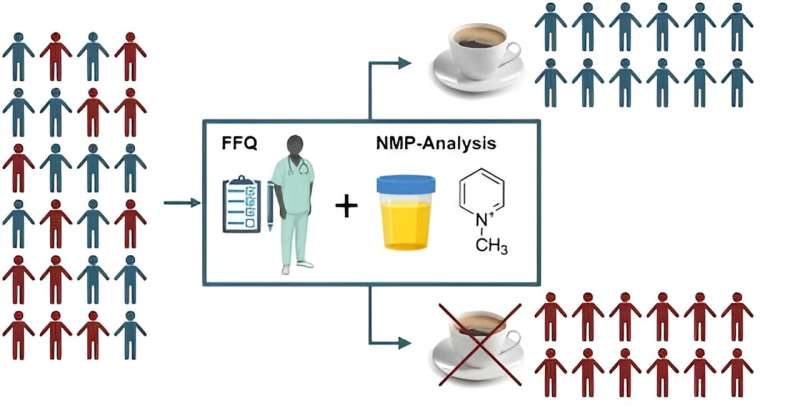This article has been reviewed according to Science X's editorial process and policies. Editors have highlighted the following attributes while ensuring the content's credibility:
fact-checked
proofread
Researchers uncover a feasible biomarker for coffee consumption

Millions of people around the world drink coffee every day. The beverage contains a large number of bioactive substances, and its health effects on the human metabolism are therefore frequently subjects of scientific studies. In many of these studies, however, the data on coffee consumption is largely based on self-reporting by the participants and is therefore not always accurate. This can affect the scientific validity of nutritional studies.
A research team led by the Leibniz Institute for Food Systems Biology at the Technical University of Munich has now validated the suitability of a specific roasted coffee compound and proposes it as a new, practical food biomarker. The study is published in the journal Beverages.
Biomarkers could provide a remedy
Reliable biomarkers could remedy this problem by using biological samples to objectively distinguish between coffee drinkers and non-coffee drinkers. "So far, however, only a few substances are known that could be used as coffee markers," says principal investigator Roman Lang from the Leibniz Institute. "However, these are not yet sufficiently validated or available in sufficient quantities to serve as reference substances for comparative measurements in nutritional studies," he continues.
The research team, which also includes nutritional physician Thomas Skurk and first author Beate Brandl from the ZIEL—Institute for Food & Health at the Technical University of Munich, has therefore comprehensively validated the roast coffee compound N-methylpyridinium as one such biomarker candidate for its suitability. Researchers at the Technical University of Munich first proposed the substance as a biomarker candidate in 2011 as part of a pilot study.
Data from more than 460 people analyzed
As part of the scientific validation, the team analyzed existing literature data. It also analyzed urine, blood and plasma samples from more than 460 people from Freising and Nuremberg who had participated in a nutrition study conducted by the enable-Cluster.
As the study shows, N-methylpyridinium is a compound that is specific to roasted Arabica and Robusta coffee. The substance is chemically very stable and its absorption into the organism is concentration-dependent. The substance can also be easily and reproducibly detected in various body fluids after coffee consumption, before leaving the body unchanged in the urine within a few hours to days.
Roman Lang, who heads the Biosystems Chemistry & Human Metabolism research group at the Leibniz Institute, explains, "As we have shown, N-methylpyridinium fulfills all the criteria that science demands of a biomarker to control food intake. Even if we cannot draw direct conclusions about the amount of coffee consumed due to various factors, the roasting substance is still suitable as a marker.
"This is because it allows us to distinguish objectively and practically between people who have drunk coffee and those who have not. We therefore propose it as a reliable qualitative biomarker for coffee consumption."
N-methylpyridinium was first proposed as a biomarker candidate for coffee consumption in 2011.
N-methylpyridinium is formed from the natural alkaloid trigonelline, which is abundant in green coffee, when exposed to high heat over 220°C. Depending on the degree of roasting, roasted Arabica and Robusta coffee beans contain concentrations of around 0.5 to 2 mg/g of the substance—regardless of special processing methods such as steaming or decaffeinating. N-methylpyridinium is contained in brewed coffee (20–40 mg/l) and can be easily detected in blood, plasma and urine samples.
In the U.S. alone, 74% of the population over the age of 20 describe themselves as coffee drinkers. In European countries, the calculated per capita consumption of roasted coffee in 2022 ranged from around 4 kilograms in Italy to 10 kilograms in Luxembourg.
More information: Beate Brandl et al, Validation of N-Methylpyridinium as a Feasible Biomarker for Roasted Coffee Intake, Beverages (2024). DOI: 10.3390/beverages10010012
Provided by Leibniz-Institut für Lebensmittel-Systembiologie




















